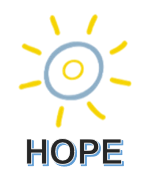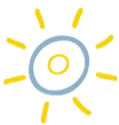MOOC Informal Caregivers-EN
Section outline
-
ERASMUS+ HOPE
KA220-HED-F8D51393, Higher Education
Responding to Heatwaves in the Older People Ecosystem

HOPE: MOOC for caregivers
- This online course is specially developed for people who like to learn by reading short texts, watching video clips and by answering questions. This tool is meant for those who take care of older people in times of heatwaves: formal and informal. But also for everyone who wants to know what can be done in times of very high temperatures, how to stay cool, and how to prevent heat stress, this is done in a fast and accessible way.
This tool is free, and when you finalized it, you can download a certificate, which is free also. To go through this course, and answering all questions will take about 30 minutes of your time. In case you have answered a question incorrectly, you will see immediately some feedback with an explanation.
Should you want to gain more in-depth information about heatwaves, their causes and their consequences, there is a free e-learning that was built with EU support, meant for healthcare and wellbeing professionals: You can click on the link below to start the MOOC for professionals.
https://e-learning.hopeheatwaves.eu/course/view.php?id=4
To start with this MOOC scroll down to PART 1
- PARTNERS
- GEMEENTE ROTTERDAM Netherlands, www.rotterdam.nl
- ISTITUTO PER SERVIZI DI RICOVERO E ASSISTENZA AGLI ANZIANI, Italy, https://www.israa.it
- IRMANDADE DA SANTA CASA DA MISERICORDIA DA AMADORA, Portugal , https://www.misericordia-amadora.pt/
- STICHTING HOGESCHOOL ROTTERDAM, Netherlands, https://www.hogeschoolrotterdam.nl
- Social Cooperative Enterprise of Cyclades, GREECE, https://e-learning.alteravita.eu/
- ELISAN RESEAU EUROPEEN POUR L INCLUSION ET L ACTION SOCIALE LOCALE
ASSOCIATION, France, https://elisannetwork.wixsite.com/elisan-network

HOPE WEB PAGE:https://hopeheatwaves.wixsite.com/hope
DISCLAIMER
The European Commission’s support for the production of this publication does not constitute an endorsement of the contents, which reflect the views only of the authors, and the Commission cannot be held responsible for any use which may be made of the information contained therein.

-
Summary
In several countries, despite increasing episodes of extreme temperatures, heat-related health impacts seem to be decreasing. This highlights the effectiveness of current prevention measures. Nevertheless, projections for Europe clearly indicate that without adequate efforts for heat–health adaptation to climate change, heat-related exposures and the associated health impacts could increase substantially. Such projections, combined with long-term trends of ageing and urbanization, strongly warrant the adoption of a long-term perspective to manage the health effects of temperature in the context of a changing climate.
To start please click on the video below.Europe’s climate in 2050
-
Summary part 2
In this part of the MOOC, various methods are introduced to help you, your family, and your patients stay cool during extremely hot days. As you have seen in the first part the impact of heat on health should not be underestimated, as prolonged exposure to high temperatures can lead to heat exhaustion, dehydration, and more severe conditions like heat stroke. Understanding how to manage body temperature and create a cooler environment is crucial, especially for vulnerable groups such as the elderly, young children, and individuals with pre-existing health conditions.
In the first section of this chapter, you will learn about practical techniques to cool down your body and maintain a comfortable core temperature. These methods include hydration strategies, appropriate clothing choices, and tips for physical activity during heat waves. By applying these techniques, you can help prevent heat-related illnesses and improve your overall comfort during hot weather.
In the second chapter of the MOOC, we will explore how to keep your living environment cool and livable during extreme heat. This includes tips on how to ventilate your home efficiently, the use of fans or air conditioning, and ways to block out heat using curtains or reflective materials. Additionally, advice will be provided on creating cooler spaces in your home, and what actions to take if air conditioning is not available.
It is important to recognize that everyone’s situation is different. What works best for one person may not be as effective for another. Therefore, it’s essential to assess your own needs and circumstances and figure out which strategies are most suitable for you, your family, and your patients. This MOOC will guide you through a range of options, but the final responsibility lies with you to tailor these suggestions to your specific situation. Staying informed and prepared can make a significant difference in your ability to cope with extreme heat.
-
Summary
After learning about the dangers of extreme heat on health, particularly for vulnerable individuals, and discovering ways to keep yourself, your family, and your home cool, this chapter expands the focus to your broader community and city. It explores the significant impact of heat on urban areas, where the effects can be even more intense. You'll gain insight into the urban heat island effect and how urban areas retain more heat. This chapter emphasizes the actions you can take to reduce the heat in your neighborhood, from encouraging the creation of green spaces to advocating for the use of cool roofs and reflective materials.
Moreover, this section highlights the role of community engagement and local government in combating the risks of extreme heat. You’ll learn about strategies such as planting trees, enhancing urban planning, and raising public awareness about the importance of reducing heat exposure. Taking these steps not only helps to cool your neighborhood but also improves the overall quality of life and resilience of your city during heatwaves. Whether through small changes in your home or collective efforts in your local area, you have the power to make a significant difference in mitigating the effects of extreme heat in your community.
-
-
EEA's climate and energy package
-
EEA report:
Updated climate and energy indicators
- Greenhouse gas emissions from energy use in buildings in Europe
- Greenhouse gas emission intensity of electricity generation in Europe
Datasets
-






